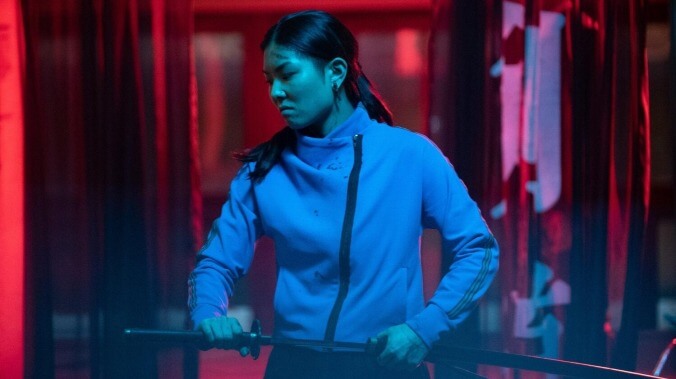Yakuza Princess is pretty dull for a movie called Yakuza Princess
This cross-cultural Brazilian-Japanese action flick has style but little excitement


If you truly love B-movies, then the clunkiness is part of the charm. Was it shot on cheap-looking digital? That’s fine—even a VHS camcorder will work, honestly. (It adds texture.) Is the acting stiff? That’s the director’s brother-in-law, so cut him some slack. Is the dialogue is in English, even though the film takes place in a country where English is not commonly spoken? It’s called the international market, duh. That being said, the reason that aficionados make these excuses is because good B-movies bring something different to the screen, something that transcends meager production value (and, conversely, can sink the most expensive studio project when it’s absent). That thing is fun, and Yakuza Princess needs a lot more of it.
The biggest issue with Vincente Amorim’s adaptation of the Brazilian comics series Samurai Shiro isn’t that it’s trying really hard to look and feel like John Wick. Nor is it that the actual fight scenes are cut to ribbons, a problem for any film that makes martial-arts action its ostensibly draw. While frustrating, both of those are such common sins that you can hardly condemn any one director for committing them. What you can condemn Amorim and his co-writers for, though, is somehow managing to make gonzo violence and warring yakuza clans boring. At 112 minutes, this film is way too long for the amount of story contained within—which, again, would be a forgivable offense, had Amorim filled the extra time with something entertaining. Instead, all we get is inertia, as we wait with the main character for her fate to reveal itself.
Cross-continental pop singer MASUMI makes her feature acting debut as Akemi, a Japanese expat living in Brazil. Her only tie to her ancestral homeland was the grandfather who raised her, and he died long ago. She’s still immersed in Japanese culture, however, working at a Japanese night market in São Paulo—home of the world’s largest Japanese expat community—and spending her free time exercising her pipes at the city’s many karaoke bars.
It’s at one of these where the story belatedly gets going, as a confrontation with a hostile gang of lecherous barflies leads to a collision between Akemi and mystery badass Shiro (Jonathan Rhys Meyers). We’ve spent much of the preceding 38 minutes following Shiro as he does cool, Tarantinoesque things, like stoically walking out of a hospital with bandages on his face and a samurai sword in hand as chaos erupts behind him. But there’s been no context for who he is or what he’s trying to do. Once he hands Akemi a katana, it seems as if his purpose has been fulfilled, and he disappears from the narrative. The word “seems” is important there, though, as no greater weight is placed on this moment than any other in the film.
There’s no real momentum or pacing to Yakuza Princess, merely a shaggy assemblage of scenes jumping between characters and continents with little distinction between meat and filler. Is Amorim slavishly invested in even the smallest details of this story, or he does he basically not care about any of it? Either way, the weak direction makes it difficult to stay invested, as great details like a yakuza retirement home and a mob enforcer who snacks while he kills are lost in an undifferentiated blur of tones, storylines, and flashy camerawork. Even the gore is applied inconsistently: An early scene of a would-be rapist having his hand sliced off spurts gleeful fountains of blood, while a climactic blow of Akemi’s sword barely breaks the skin.
For someone who’s essentially a non-actor, and who had never picked up a sword before this film, MASUMI is passable in her role as an ordinary person confronted with an extraordinary legacy. Rhys Meyers is more animated, taking elements of Tom Hardy as Mad Max and Hardy lookalike Logan Marshall-Green in Upgrade to play a wild-eyed, rubber-faced amnesiac assassin who seems surprised by his own capacity for violence. Both of these characters have the potential to transcend stock action-movie archetypes. Neither does. A movie need not have a big budget to be exciting, but it does need to have vision. Yakuza Princess is more interested in Steadicam shots through neon-lit nightclubs than it is in telling a compelling story.